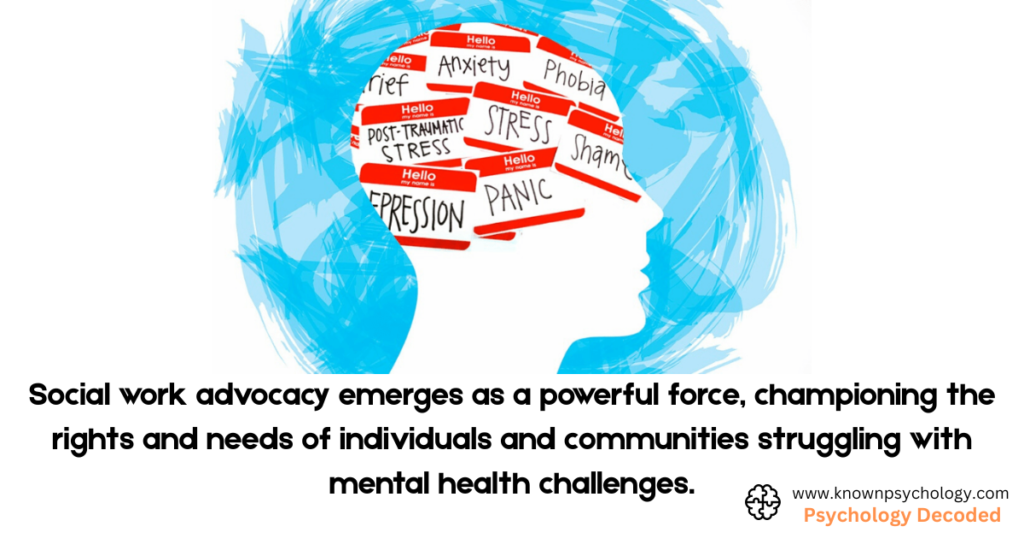Mental health is a cornerstone of overall well-being, yet it remains a field plagued by stigma, inequality, and systemic barriers. Social work advocacy emerges as a powerful force, championing the rights and needs of individuals and communities struggling with mental health challenges.

By addressing the social determinants of mental health and advocacy for policy changes, social work advocates play a crucial role in shaping better mental health outcomes for all. But how does this work, and how can social work shape better mental health outcomes?
The Power of Keen Attention
Social work advocacy is rooted in the profession’s core values of social justice and human dignity. Generally speaking, social workers are uniquely positioned to understand the complex interplay between individual experiences and broader societal factors that influence mental health. They work with individuals, families, and communities, gaining first hand insight into the barriers they face in accessing quality mental health care.
One of the keyways social work advocacy improves mental health outcomes is by addressing the social determinants of mental health. These are the non-medical factors that influence health outcomes, including poverty, housing insecurity, discrimination, lack of access to education and employment, and social isolation. Social workers advocate for policies and programs that mitigate these factors, creating a more equitable and supportive environment for individuals to thrive.
For example, social workers might lobby for affordable housing initiatives, recognizing that stable housing is essential for mental well-being. They might advocate for increased access to education or job training, understanding that economic security can significantly reduce stress and improve mental health. They might also work to combat discrimination based on race, ethnicity, sexual orientation, or gender identity.
Barriers to Care
Beyond addressing social determinants, social work advocacy is crucial in improving access to mental health services. Many individuals face significant barriers to accessing care, including:
1. Financial Barriers:
Mental health services can be expensive, and many insurance plans offer inadequate coverage. Social workers advocate for policies that expand access to affordable mental health care, such as Medicaid expansion, parity laws requiring insurance companies to cover mental health services on par with physical health services, and funding for community-based mental health centers.
2. Geographic Barriers:
In rural areas, access to mental health professionals can be limited. Social workers advocate for teletherapy services and the recruitment and retention of mental health professionals in underserved areas.
3. Stigma:
Stigma surrounding mental illness can prevent individuals from seeking help. Social workers engage in public education campaigns to reduce stigma and promote understanding of mental health conditions.
4. Cultural Barriers:
Mental health services are often designed with a Western, individualistic approach, which may not be appropriate or effective for individuals from diverse cultural backgrounds. Social workers advocate for culturally competent care that is sensitive to the unique needs and values of different communities.
Furthermore, social work advocacy plays a crucial role in shaping mental health policy. Social workers are involved in advocating for legislation that promotes mental health awareness, improves access to services, and protects the rights of individuals with mental illness. They work with elected officials, policymakers, and community stakeholders to influence policy decisions that impact mental health.
Specifically, social work advocates might:
- Push for funding for mental health research: This research can lead to the development of new treatments and interventions for mental health conditions.
- Advocate for the implementation of evidence-based practices:
- Lobby for consumer protections: This safeguards the rights of individuals with mental illness and prevents discrimination.
- Promote policies that support mental health in schools and workplaces: This creates a more supportive environment for students and employees.
Finally, social work advocacy extends to empowering individuals and communities to advocate for their own mental health needs. Social workers facilitate support groups, provide training on self-advocacy skills, and help individuals connect with resources and services. By empowering individuals to speak out about their experiences and advocate for their rights, social workers contribute to creating a more just and equitable mental health system.
In conclusion, social work advocacy is an indispensable force in shaping better mental health outcomes. By addressing the social determinants of mental health, improving access to services, influencing policy decisions, and empowering individuals and communities, social work advocates are working to create a world where everyone has the opportunity to achieve optimal mental well-being.
Shaista specializes in Personality Psychology and Organizational Behaviour, with a deep interest in how people think, grow, and interact within systems. She writes for multiple websites, bringing clarity and insight to topics across human behavior, mental health, and workplace psychology.


